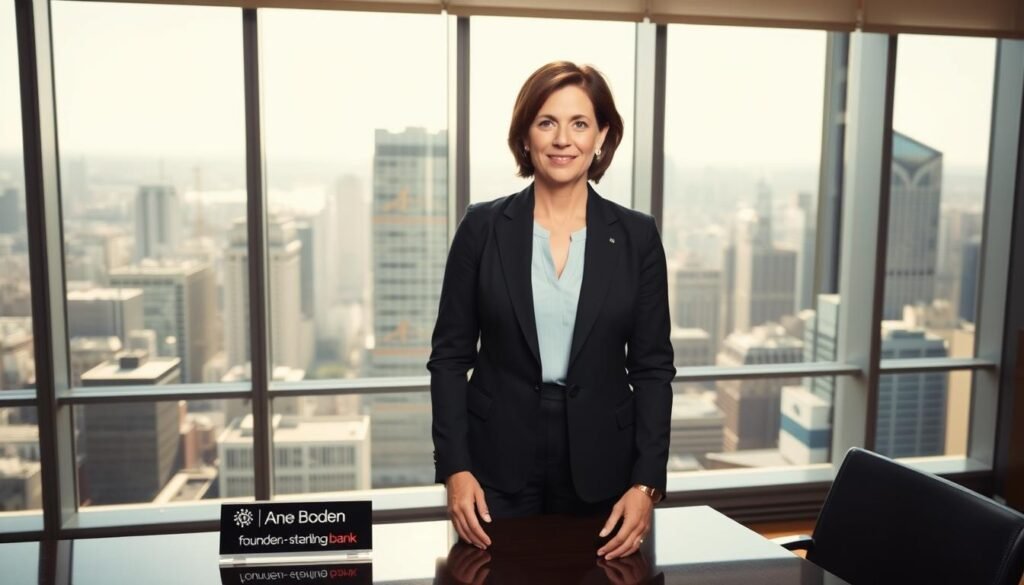At 54, Anne Boden embarked on a journey to disrupt the traditional banking industry by founding Starling Bank. She became the first woman to found a British bank, challenging industry stereotypes and paving the way for future generations.
With a background in traditional banking, Boden leveraged her experience to create one of the UK’s most successful digital banks. Starling Bank has been recognized as a three-time winner of Best British Bank at the British Bank Awards.
Her remarkable story is one of perseverance, innovation, and determination, inspiring women entrepreneurs, particularly those pursuing second careers or entering tech later in life.
Key Takeaways
- A trailblazer in the fintech industry, Anne Boden founded Starling Bank at 54.
- Starling Bank is a three-time winner of Best British Bank.
- Boden challenges industry stereotypes as the first woman to found a British bank.
- Her journey inspires women entrepreneurs, especially in second careers or late tech entries.
- Starling Bank is one of the UK’s most successful digital banks.
The Unlikely Banking Revolutionary
From her humble beginnings in Swansea, Anne Boden rose to challenge the status quo in banking. Born in January 1960, Anne grew up in a modest household as the daughter of a steelworker and a department store worker.
From Swansea to Financial Disruptor
Anne’s journey began in Bon-y-maen, a suburb of Swansea, where she developed a strong foundation in education. She attended Cefn Hengoed Comprehensive and later graduated from Swansea University in 1981 with a degree in Chemistry and Computer Sciences. This unique blend of skills laid the groundwork for her future in banking and entrepreneurship.
Breaking the Banking Stereotype
Anne Boden is not your typical fintech entrepreneur. She’s a 5-foot-tall, middle-aged woman from an ordinary background who defied all banking stereotypes. At 54, she was “prepared to fail” and confident enough not to care if people thought she was crazy. As she famously said, “I’m a woman. I’m 5ft tall. I’m Welsh. I’m middle-aged. I’m from a very ordinary background and I’m the sort of person who’ll chat to somebody in the ladies!”
Anne’s outsider status became a strength, allowing her to break through barriers in an industry where only 1% of venture capital goes to all-female-founded teams. Her determination and unique perspective paved the way for her success as a bank founder and a role model for aspiring entrepreneurs.
Early Life and Career Foundations
Anne Boden’s journey to becoming a banking revolutionary began with her early life and education in Wales. Her academic background and initial career steps played a crucial role in shaping her future in the financial sector.
Welsh Roots and Education
Anne Boden studied Chemistry and Computer Sciences at Swansea University, showcasing her early interest in technology. Growing up, her parents encouraged her curiosity by providing an unlimited budget for books, fueling her fascination with science, biographies, and understanding how the world works. This foundation at home laid the groundwork for her future endeavors.
First Steps in Banking
After graduating, Boden had initially planned to pursue a career in information technology. However, she accepted a job as a graduate trainee with Lloyds Banking Group, marking the beginning of her journey in the banking industry. This step into the world of banking was the first of many that would eventually lead her to found Starling Bank.
Building Expertise Across Financial Institutions
Boden’s career progressed as she worked at various financial institutions, including Standard Chartered Bank, UBS, and AON Corporation. She later joined ABN AMRO and RBS, where she served as Head of EMEA and head of Global Transaction Banking, running a payments business across 34 countries. While working at Standard Chartered, she earned her MBA from Middlesex University in 1990. These experiences across different banks gave her unique insights into the industry’s strengths and weaknesses, informing her vision for a more innovative banking experience.
Throughout her career, Boden developed a deep understanding of global banking operations and the need for customer-centric financial services. This expertise would later be pivotal in shaping the future of Starling Bank, bringing a fresh perspective to the banking world.
The Vision Behind Starling Bank
In 2012, Anne Boden took on the challenge of helping Allied Irish Banks recover from the financial crisis, sparking her vision for a modern bank. As she navigated the complexities of the financial institution, she began to reimagine banking in a way that would put the power back in the hands of the consumer.
Post-Financial Crisis Insights
Anne Boden joined Allied Irish Banks as Chief Operating Officer at a critical juncture. The 2008 credit crunch had left Ireland devastated, and banks were largely seen as the culprits. However, four years later, despite the technological revolution transforming various industries, banking seemed stuck in the past. As Anne observed,
“Technology had transformed how we shop, how we holiday, how we live, but banking was stuck in the past, pretending it hadn’t happened.”
This realization fueled her frustration with traditional banking’s resistance to change.
Her role at Allied Irish Banks allowed her to gain valuable insights into the banking system and identify areas ripe for innovation. She saw an opportunity to leverage technology to create a more customer-centric banking experience.
Reimagining Banking for the Digital Age
Anne Boden envisioned a bank that would operate without the bureaucracy that plagued traditional banking institutions. She conceptualized a bank that would offer instant account opening, spending notifications, insights into spending patterns, and savings goals. The idea was to create a bank with modern features like photo check deposits, card-lock facilities, and 24-hour support, all without the need for physical branches.
The vision centered on using technology to solve real customer pain points rather than merely digitizing existing banking processes. This approach would enable customers to manage their finances more effectively and have greater control over their money.
| Traditional Banking | Starling Bank’s Vision |
|---|---|
| Bureaucratic processes | Instant account opening |
| Limited customer control | Spending notifications and insights |
| Physical branch dependency | 24-hour support without branches |
By reimagining banking for the digital age, Anne Boden aimed to create a more consumer-friendly business model that would revolutionize the way banking was done.
Launching a Banking Revolution at 54
With decades of experience in the financial sector, Anne Boden took a bold step in 2014 by launching Starling Bank. This move not only marked a significant milestone in her career but also signaled the beginning of a new era in digital banking.
The Bold Decision to Start a Bank
In June 2014, Anne Boden founded Starling Bank, originally named Possible Financial Services, with the tagline “Bank Possible.” Her vision was to create an entirely online bank that provided customers with easier feedback mechanisms. Boden left her secure executive position to start this new venture, demonstrating her commitment to revolutionizing the banking industry.
Armed with extensive experience and a substantial volume of research, Boden returned to the UK and purchased a terraced house in Marlow. Despite having no office or business cards, she persisted in selling her vision to potential stakeholders.
Early Challenges and Persistence
The journey was not without its challenges. Boden faced numerous rejections and “unbelievable” pressure during this period. She worked from coffee shops, sending countless emails that began with “I’m Anne, I’m starting a bank. Will you help me?” Her persistence paid off as she convinced top firms to undertake legal, regulatory, and branding work on a contingency fee arrangement, accumulating over £1 million in debt.
To maintain her motivation, Boden read biographies of successful entrepreneurs, particularly those who had faced significant challenges. This approach helped her navigate the difficulties of establishing a new business at the right time.
| Challenge | Description | Outcome |
|---|---|---|
| Astronomical Funding Requirements | Securing sufficient funds to launch the company | Successfully convinced investors to support the venture |
| Stringent Regulations | Complying with banking regulations and obtaining necessary licenses | Obtained banking license after navigating regulatory hurdles |
| Competition from Established Institutions | Differentiating Starling Bank from existing banks | Focused on customer-centric features and digital innovation |
The Monzo Split: A Pivotal Moment
The departure of Tom Blomfield from Starling Bank marked a pivotal moment in Anne Boden’s journey. As the founder of Starling Bank, Boden had to navigate the challenges that arose from this significant change in her business.
Building the Initial Team
Initially, Boden and Blomfield worked together to build the foundation of Starling Bank. They assembled a team of dedicated professionals who shared their vision for a modern banking experience. This partnership was crucial in driving the bank’s early success.
The Dramatic Departure
The tension between Boden and Blomfield came to a head in February 2015 when Blomfield resigned to found Monzo, taking four other directors with him. This departure was a significant blow to Starling Bank, affecting the people who were integral to its operations. The reason behind this split was largely due to differing attitudes towards investment opportunities.
Rising from the Ashes
Despite the setback, Boden demonstrated her resilience as a business leader. She worked tirelessly to rebuild the team and secure new investment for Starling Bank. This period was crucial in establishing the bank as a viable company in the competitive financial landscape.
| Year | Event | Impact on Business |
|---|---|---|
| 2015 | Tom Blomfield’s Departure | Loss of key team members |
| 2015 | Rebuilding Efforts | Securing new investment |
In the end, Boden’s determination and leadership helped Starling Bank navigate this challenging period, ultimately strengthening its position in the market. This experience was a valuable lesson in the importance of finding the right business partners and making tough decisions to ensure the success of the company.
Anne Boden – Founder – Starling Bank: Securing the Future
Anne Boden’s determination to launch Starling Bank was put to the test when she was summoned to meet Harald McPike, a potential investor, in late 2015. After the tumultuous split with Monzo, Boden had to rebuild her team from scratch. An old friend appeared uninvited, offering to help, and soon, a new team formed around her. This team was comprised of “mainly older, more experienced, quiet people, serious people,” who were dedicated to the cause.

The Bahamas Meeting with Harald McPike
For eight months, the team worked without pay, driven by their commitment to the project. The hard work paid off when Boden was invited to the Bahamas to present her vision to Harald McPike. Over three days, partly on McPike’s yacht, he grilled her with “the most intelligent questions I’d ever been asked about Starling.” This meeting was a turning point; by the time Boden flew back home, she had secured £48 million in backing.
From Banking License to Launch
The investment from McPike was a significant milestone, but the journey wasn’t over yet. In January 2016, the company rebranded from “Possible Financial Services” to “Starling Bank,” marking a new chapter. The efforts culminated in July 2016 when Starling Bank received its banking license in the UK, a month before Monzo received theirs. This achievement was a testament to Boden’s perseverance and the team’s dedication. With the license in hand, Starling Bank was one step closer to revolutionizing the banking industry.
The £48 million investment not only secured Starling Bank’s future but also underscored the confidence investors had in Anne Boden’s vision for a modern, digital banking experience. As Starling Bank moved forward, it was poised to make a significant impact on the British banking landscape, driven by innovative technology and a customer-centric approach.
Starling’s Innovative Approach to Banking
With a mission to eliminate bureaucracy, Starling Bank has redefined the banking experience for its customers. Under the leadership of Anne Boden, the bank has introduced a range of innovative features that have transformed the way customers interact with their money.
Customer-Centric Features
Starling Bank’s customer-centric approach is reflected in its streamlined account opening process, which takes mere minutes to complete, unlike traditional banks where it can take weeks. The bank offers instant spending notifications and insights, enabling customers to track their spending patterns across categories such as rent, coffee, and transportation. Additionally, features like photo check deposits, card-lock facilities for misplaced cards, and 24-hour support have made banking more convenient and accessible.
Key Features:
- Instant account opening
- Real-time spending notifications
- Photo check deposits
- Card-lock facility
- 24-hour customer support
Award-Winning Technology
Starling Bank’s commitment to technology has earned it numerous accolades, including multiple “Best British Bank” awards. The bank’s digital platform is designed to provide an exceptional user experience, with features that cater to the diverse needs of its customers.
| Award | Year |
|---|---|
| Best British Bank | 2020 |
| Best British Bank | 2021 |
| Best Mobile Banking App | 2022 |
Building a Different Kind of Bank Culture
Anne Boden has also focused on creating a unique bank culture, with women holding 40% of senior roles, a significant departure from the male-dominated banking industry. This diverse and inclusive culture has contributed to the bank’s success and sets it apart from traditional banking institutions.
Milestones and Achievements
Anne Boden’s relentless pursuit of innovation has propelled Starling Bank to new heights, achieving remarkable growth and recognition. Under her leadership, the bank has expanded significantly, both in terms of its customer base and workforce.
Growth and Recognition
Starling Bank has experienced unprecedented growth, now boasting 1.8 million customer accounts and a staff of more than 1,000 employees. Notably, women fill 40% of the senior roles, showcasing a commitment to diversity. The bank’s customer-centric approach has been a key factor in its success, allowing it to stand out in a competitive banking landscape.
Key business milestones include significant funding rounds, innovative product launches, and strategic expansion efforts. These achievements have not only contributed to the bank’s growth but also positioned it as a leader in the digital banking sector.
Awards and Honors
Starling Bank’s excellence has been recognized through various prestigious awards. The bank was named Best British Bank at the British Bank Awards for the third consecutive year, a testament to its consistent performance and innovation. Additionally, Anne Boden was awarded an MBE in 2018 for her services to financial technology, highlighting her impact on the industry.
In 2020, Anne Boden was named CEO of the Year at the Digital Masters Awards, further acknowledging her leadership and vision. These accolades underscore the bank’s commitment to delivering exceptional customer experiences and its role in driving digital transformation in the banking sector.
As the first UK digital consumer bank to break even and turn profitable, Starling Bank has set a new standard for digital banking. Its success has also prompted traditional banks to enhance their digital offerings, contributing to a more competitive and innovative banking industry.
Leadership Style and Personal Philosophy
Anne Boden’s approach to leadership is characterized by her willingness to challenge industry norms. As the founder of Starling Bank, she has been instrumental in revolutionizing the banking sector with her innovative and customer-centric approach.
Breaking Industry Norms
Boden’s leadership style is unconventional and has been a key factor in Starling Bank’s success. With 40% of senior roles filled by women, Starling Bank has achieved a level of diversity that is rare in the banking industry. Boden’s commitment to creating a diverse and inclusive workplace culture is evident in the way she has built her team.
Work-Life Integration
Boden is known for her intense dedication to her work, saying, “I only have work – and I enjoy every minute of it.” She doesn’t believe in maintaining a work-life balance, instead, she focuses on integrating her work and personal life. Boden’s personal philosophy is centered around focusing on “what you have rather than what you don’t,” reflecting her positive outlook on life.
Her approach to work and life is also reflected in her personal choices, including not cooking and not having married. Boden’s story is a testament to her resilience and determination, from her parents dancing to TV commercials to being the first on the dancefloor at the office.
Conclusion: Anne Boden’s Lasting Impact on Banking
Anne Boden’s story is one of disruption and innovation, transforming the traditional banking landscape. As the founder of Starling Bank, she has pioneered a new era in digital banking, making it more accessible and customer-friendly.
Her journey, documented in her 2020 book “Banking On It: How I Disrupted an Industry,” has inspired entrepreneurs, particularly women entering the tech space later in life. Through her roles in UK Finance, the UK government’s Board of Trade, and the World Economic Forum, Anne Boden has had a broader impact on the financial industry.
The success of Starling Bank has forced traditional banks to improve their digital offerings, benefiting millions of customers. Anne Boden’s persistence and unconventional approach have proven to be strengths in disrupting an entrenched industry, leaving a lasting legacy in fintech and paving the way for more diverse leadership.
FAQ
What inspired Anne Boden to start a digital bank?
After experiencing the limitations of traditional banking firsthand, Anne Boden was driven to create a more customer-centric financial institution, leveraging technology to provide a better banking experience.
How does Starling Bank differentiate itself from other banks?
Starling Bank is known for its innovative approach to banking, offering features such as real-time spending updates, goal-based savings, and a user-friendly mobile app, all designed to put customers in control of their finances.
What are some of the key awards and recognitions received by Starling Bank?
Starling Bank has received numerous awards, including Best British Bank and Best Fintech Company, in recognition of its commitment to innovation, customer service, and technology.
How has Anne Boden’s leadership style contributed to Starling Bank’s success?
Anne Boden’s leadership is characterized by a willingness to challenge industry norms and a focus on creating a positive work-life balance for employees, which has helped foster a culture of innovation and collaboration at Starling Bank.
What are some of the benefits of banking with a digital bank like Starling?
Customers of Starling Bank can enjoy benefits such as lower fees, real-time account updates, and the ability to manage their finances on-the-go through the bank’s mobile app, making it an attractive option for those looking for a more modern banking experience.
How does Starling Bank approach customer service?
Starling Bank prioritizes customer service, offering a range of support channels, including in-app messaging and online support resources, to ensure that customers receive the help they need in a timely and effective manner.
What role has technology played in Starling Bank’s growth and success?
Technology has been a key driver of Starling Bank’s growth, enabling the bank to develop innovative products and services, improve operational efficiency, and enhance the overall customer experience.






